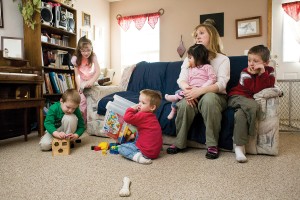
by Loretta Park
Ogden Standard-Examiner (Davis Bureau)
02/11/2010
Jennifer Gardner knows this is not the year to ask legislators for an increase in the reimbursement foster families receive to care for children in state custody.
But “please do not cut us again,” said Gardner, president of the Utah Foster Adoptive Family Association.
The Health and Human Services Appropriations subcommittee is not recommending cutting the reimbursement rate for foster families for the current fiscal year, even though Gov. Gary Herbert has asked for 3 percent cuts across the board, said Rep. Ben Ferry, R-Corinne.
“But we still have to address 2011 (fiscal year),” said Ferry, a member of the committee.
What will happen to foster family reimbursement for the next fiscal year won’t be known until the Legislature adjourns March 11, he said.
Utah’s foster parents receive 40 percent less in reimbursement than the nationally recommended level, said Duane Betournay, director of the Division of Child and Family Services.
If something isn’t done, foster families can expect a cut for fiscal year 2011, which begins July 1, he said.
“We’re losing families because they can no longer afford to be foster families,” Betournay said.
“I would love to give (foster parents) an increase,” said Sen. Allen Christensen, R-North Ogden, who is the chairman of the committee. “I’m not trying to make apologies, but everyone is getting cuts this year.”
Foster families receive from the state a basic rate of $15 per day per child for children ages newborn to 11 years old. The rate is increased to $18 per day if a child in that age group needs specialized care. The basic reimbursement rate increases for older children.
That $15 a day boils down to $450 a month, Gardner said. It costs her family closer to $525 — an additional $75 a month — to care for a foster child.
Gardner said a survey of her group’s members shows the average Utah foster family currently spends $200 more a month per child than they receive from the state.
The reimbursement pays for food, clothes, shelter and transportation to events like court hearings, visitation with parents, friends and school activities.
The state does cover medical costs and basic school fees, but “If the child wants to play any sports or (participate in) other activities, it comes out of our pocket,” she said.
Gardner said she does not understand how legislators who receive $61 a day for meals during the session can even consider cutting reimbursements for foster care.
What foster families receive now is 50 cents less per day per child than they received a year ago, said Mindy Lundgreen of the Utah Foster Care Foundation.
Gardner and her husband, Keith, worry that if budget cuts continue, fewer people will want to be foster parents and the state will have to look at institutional care.
“That could cost the state more,” Jennifer Gardner said.
The cost of institutional care runs from $62 to $120 a day per child, she said.
Christensen and Ferry both said they want to avoid placing children, who are in state custody through no fault of their own, in institutional care.
“Foster care is a better step from where they came from,” Ferry said.
The Gardners decided five years ago to become foster parents after learning they could have only two biological children, Aubry, who is now 10, and Denton, who is 7.
Keith Gardner said the experience has been rewarding, even when foster children are returned to their biological parents.
“It’s amazing to watch how much they progress and change,” he said.
He admits it is gut-wrenching when the child leaves, but it is Aubry who reminds them why they are foster parents.
“She tells us they are lucky to be able to go back to their mom,” Keith Gardner said.
Aubry said she gets sad when the children leave, but “I usually cheer up after an hour.”
And then she cannot wait until another child is placed in their home.
Since the Gardners, who live in unincorporated Box Elder County, decided to become foster parents, they have adopted three of the 10 children who have been placed in their home — Brekken, 3, Canden, 3, and Mylie, 20 months.
“We wanted a houseful of kids, whether they stayed for a while or forever,” Jennifer Gardner said as she balanced two children on her lap.
Becoming a foster parent does not mean just providing a bed, the Gardners said. It also means locking everything up that could harm a child, undergoing training and spending money to make the house and yard as safe as possible.
“We’re not doing it for the money,” she said.






